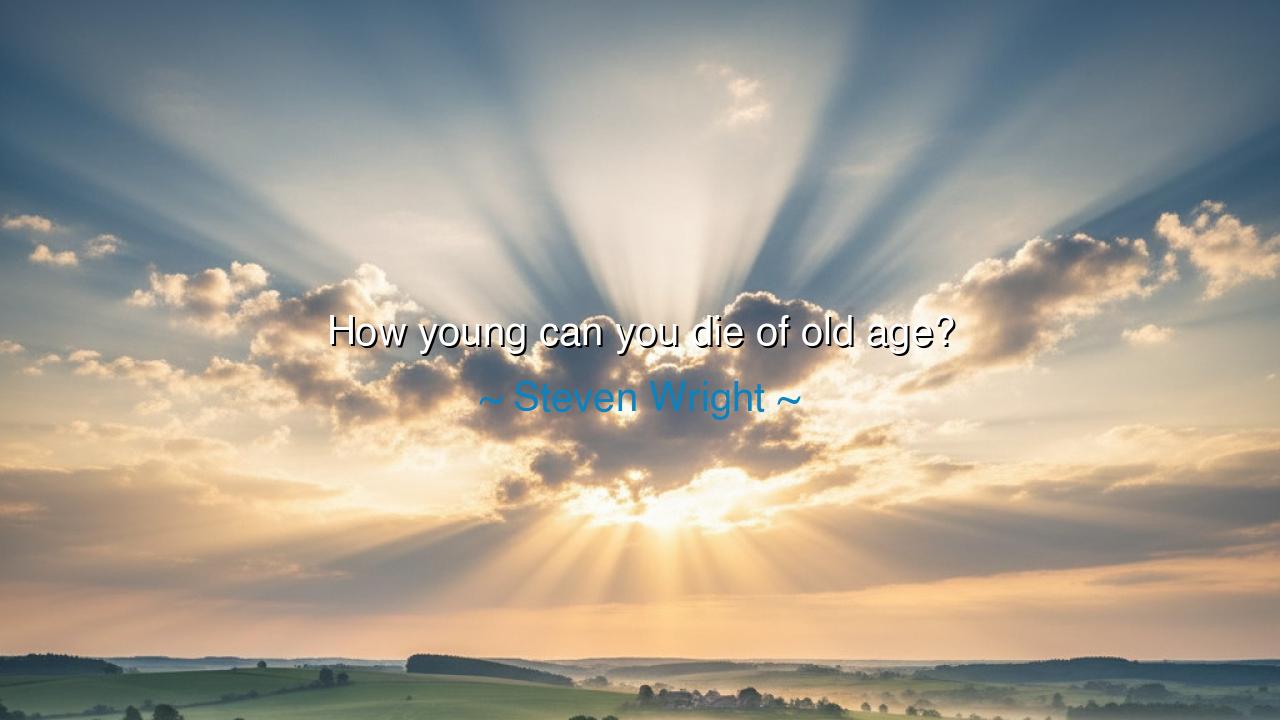
How young can you die of old age?






"How young can you die of old age?" This wry and thought-provoking question from Steven Wright brings to light the paradox of life and mortality, challenging the conventional understanding of aging. Wright’s words invite us to ponder a crucial aspect of the human experience: what does it truly mean to age? Is it simply the number of years we accumulate, or is it something more profound—an internal process, a state of mind that could set in at any point, even while we still have youthful vigor? This quote encapsulates the fear, the humor, and the existential questioning that surrounds our inevitable journey toward death, and the possibility that we may find ourselves already experiencing the decline of age long before our bodies actually show the signs.
In the teachings of the ancients, age was often considered a natural progression of life, but it was also acknowledged as a slow and sometimes painful decline—not just of the body, but of the spirit and mind. Socrates famously faced his impending death with calmness, but he also warned against allowing mindless routines or an unexamined life to turn the process of aging into a passive march toward death. He saw death as an inevitable end, but one that could be approached with wisdom and reflection, rather than fear or regret. Socrates died as he had lived, with an awareness of his inner self, not merely his body. This philosophical approach implies that one can, in a sense, “die” of old age far before the physical death occurs—by losing the spark of the mind, the vitality of the spirit, or the passion for life that defines true youthfulness.
The Stoics, such as Marcus Aurelius, also understood that old age was not defined simply by the body’s decline but by the loss of purpose and discipline. Aging was not just the gradual breakdown of cells but the diminishment of will and clarity if one failed to keep the mind sharp. Aurelius, in his Meditations, often wrote about the importance of staying active in thought and purposeful in action, regardless of age. He understood that youthful vigor was not a physical attribute alone but a mindset. To die of old age prematurely, in Aurelius’s eyes, was to stop growing, to cease learning, and to become consumed by the fears and regrets that accompany a life lived without intent.
Consider the life of Leonardo da Vinci, whose genius and creativity remained unmatched even in his later years. While his body may have grown frail with age, his mind was still ever-active, exploring new ideas and pushing the boundaries of art, science, and innovation. Da Vinci’s youth was not a phase defined by age but by his relentless curiosity and creativity. It is said that he continued to sketch and experiment right until his final days, showing that true youth is not measured in years but in the continual pursuit of knowledge and the joy of discovery. For da Vinci, there was no death of youth even as his physical body aged—his spirit remained vibrant, refusing to die of old age in the conventional sense.
The essence of Wright's quote is a reflection on the fragility of the human experience. How often do we witness individuals who, despite being relatively young, already seem to have lost the vitality of life? They may be physically healthy, yet their minds have grown tired, their passions have dimmed, and they move through life with a sense of dullness or resignation. This kind of living death—the death of enthusiasm, drive, or hope—is what Wright humorously points out. It is a reminder that age does not always correlate with the energy of life, and that a person can die long before their physical end, simply by ceasing to engage with the world with the zeal and curiosity they once had.
The lesson here is both a warning and an inspiration: age is not merely the passing of years, but the preservation of spirit and the intentionality with which we live. We must choose not to allow the weight of years to become a limitation, but to find ways to remain youthful in our outlook—curious, engaged, and driven by passion. Just as Socrates, Aurelius, and da Vinci understood, the true danger of old age is not the physical deterioration of the body, but the stagnation of the mind and the loss of enthusiasm for life. To prevent this, we must continue to grow, to learn, and to engage with the world as if our lives are still full of untapped potential.
In practical terms, Wright’s reflection invites us to examine our own lives—are we still alive in the fullest sense of the word? Are we pursuing our passions, challenging ourselves, and seeking meaning in the present, or are we simply waiting for the future to happen? Let us not allow the passage of time to rob us of the joy of living fully. Whether young or old, we can all choose to engage with life as if every moment matters, refusing to succumb to the limitations we often place on ourselves. Instead of asking how old we are, we should ask: how alive are we in each and every day?






AAdministratorAdministrator
Welcome, honored guests. Please leave a comment, we will respond soon